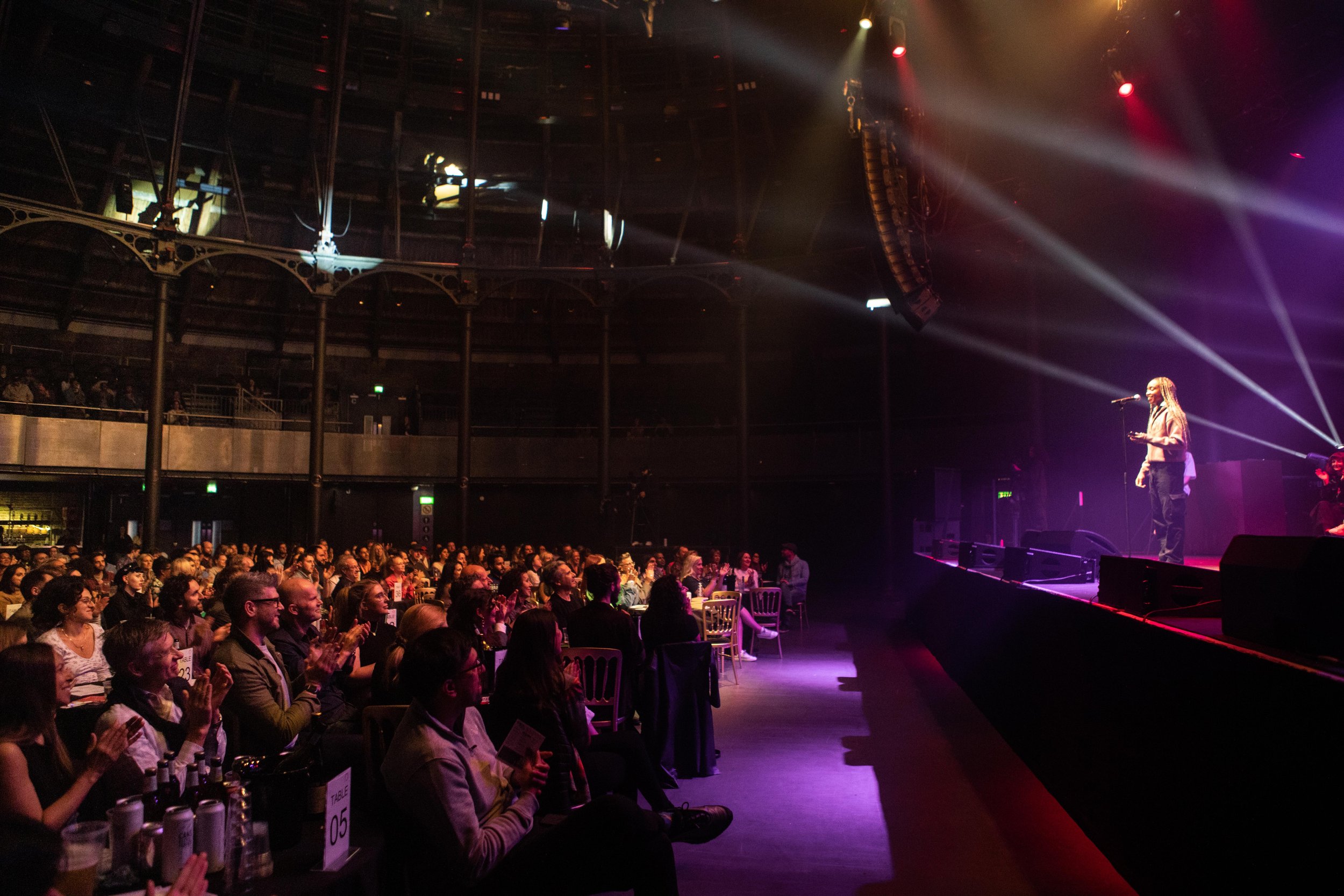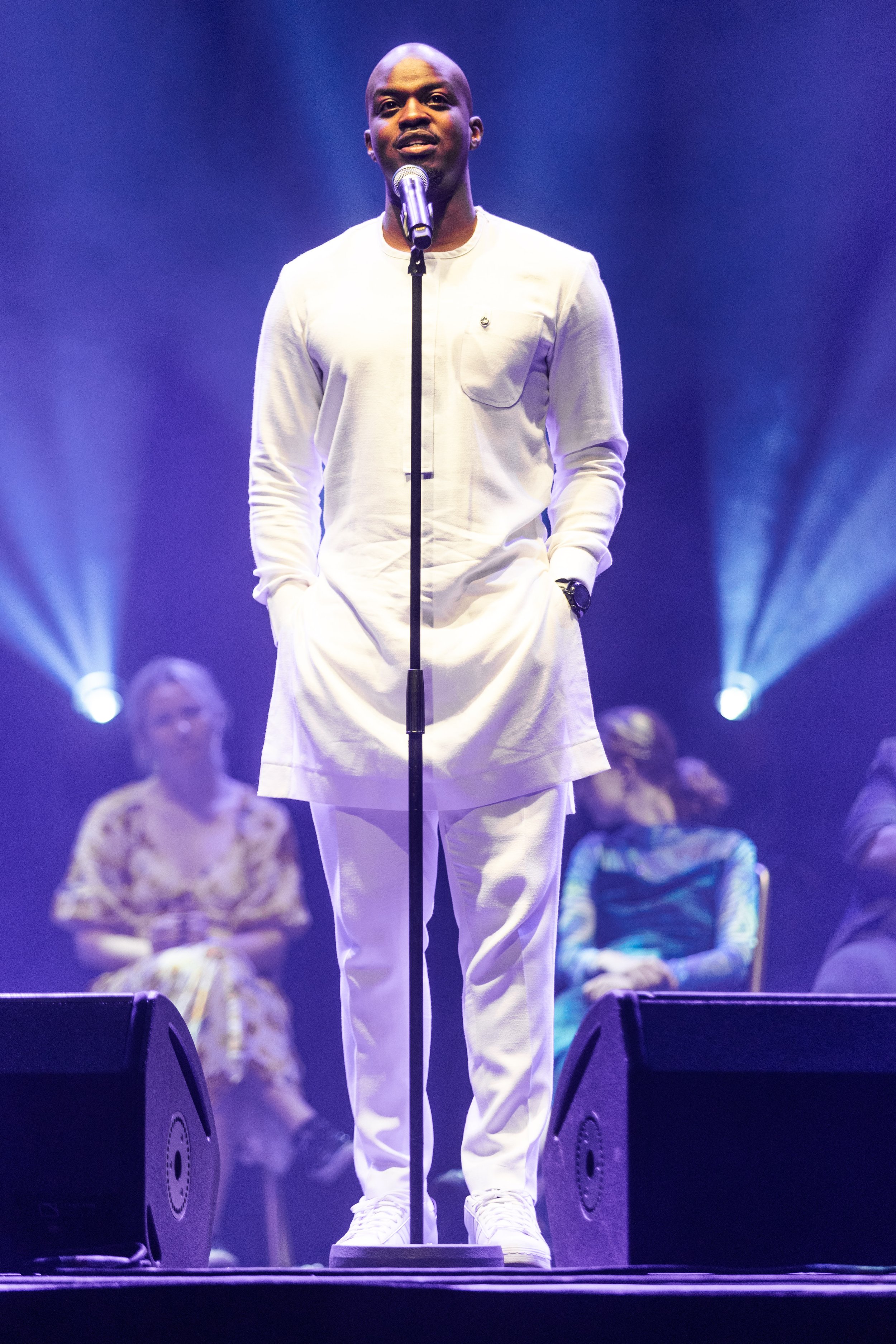The Last Word: Poetry is the Point
Image: Poetry Slam Finalists 2022 / The Roundhouse
The Last Word Poetry Slam Final has arrived: 10 of the most exciting voices in spoken word sit patiently on the stage, as they wait to brave their souls and share their most intimate thoughts with an auditorium of strangers. A female DJ confidently leads the heartbeat of the space as we all await one of the biggest nights of poetry, showcasing the best of talents from several heats across the UK, and a special performance from George the Poet himself. The night is live-broadcasted across the world from the heart of The Roundhouse. British Sign Language interpreters are animated throughout the night, intently listening and translating the poets in real time - a beautiful reminder of an evening infused with inclusivity and community. In this space led by youthful truth-tellers, everyone is welcomed.
First on to the stage is reigning champion Maureen Onwunali, as she shares ‘A Prayer to Black’. ‘Blessed Be…’ plosive alliteration permeates her verse, elevating a spiritual cadence that tends to the wounds of racism, the elephant in the room, and the cracks we step over. In light of the murder of George Floyd in 2020, and the global protests that painfully exposed police brutality and injustices that occur on a daily closer to home too, Maureen gives a tender yet powerful voice to these harsh realities: ‘Blessed Be the Black girl, may she always feel alive…’
This grounded opening is followed by the lived experiences of Yasmine Dankwah, who personifies ‘Hip Hop’. Her rhythm is infectious as her warm tone breathes life and soul into her words and the spaces in-between. Her smile radiates as her passion paints innocent pictures of growing up in South London, as she reflects on her her-story, her ancestors and the culture that raised her: ‘Hip-hop could be a woman who’d forever wear the crown.’
Image: The Roundhouse
Another finalist, now second runner up, Ife Grillo approaches the mic - he takes up space, quietly attracting authority. Vocally, he explores the freeing movement of dance and reflects on how his people have ‘Jumped high so we never felt low’. He too carries the weight of the world, yet he acknowledges that he doesn’t dance alone as ‘ghosts dance’ with him. We are left with a heavy impression of generations of his enslaved ancestors swaying in the wind. This brutal image juxtaposes the present moment, as Ife lifts us with daring humour. His hips don’t lie as he challenges the world to ‘try to keep up’. In this moment, it’s clear that poetry becomes an act of defiance.
Jacqueline Nkhonjera, a vision in green print, explores the stories of the men in our global family, chosen or blood, who remain outside of society’s affection and understanding. With grave seriousness, Jacqueline’s aura carries a sensitive awareness, exposing the realities that boys to men face in a challenging, vicious cycle of absent love and care. Her second poem rumbles with death, as she exposes how a precious life was taken too soon. She is haunted too by ‘memories’, as they manifest into ‘living creatures’. As living legend Malika Booker walks onto the stage, I can’t help but to relate their essence and knowing presence. Both of these strong, black women carry the stories of those who have come before them - and choose to courageously share their truths with us. We hold space for the shadows of our world together.
The reality of death creeps into the space by finalist Liva Felter McWhir. First to grace the stage, Liva is dressed in ethereal green. Like Jacqueline, she too is haunted by death, as she ‘forgives the world ‘cos it has you in it’. She explores the tension of losing love: ‘I think if I’d do this all again I’d never pick you… I think if I’d do this all again, I’d never pick someone else.’ This tension between life and death, love and aversion, is echoed in the second act, as T.S Elliot prize winner, Poetry Slam Champion and judge Joelle Taylor takes the stage.
Image: Jaspreet Kaur, Malika Booker, Joelle Taylor / The Roundhouse
Joelle affirms the holy space, as she draws attention to the act of poetic excellence and community. She purposefully beats her chest, in her palpably expressive manner, and introduces her poem as we all mmm and click: ‘Everything You Have Ever Lost… is in here’. She effortlessly moves from marking our faces as battlefields, our skin as a colour that contains us, and points us to notice how, ‘Some boys cry with their fists’. The space becomes alive, as she captures an air of solidarity: ‘Trees hold hands beneath the earth’. Echoing our nature, we return back to our essence as communal beings.
The depth of feminine energy is tangible in Ria Bronte’s performance, as she delivers an ‘Ode to Compassionate people’. To open the second act, the stage is drenched in blue light with beaming spotlights directed towards the heavens - as if Ria was an angel in the clouds. As a vessel of emotion, powerful yet fragile, Ria flips the script of shame, openly unlearning the suffering that is tied to being a sexually expressive young woman. Her performance balances both light and shadow, with intermittent whispers shortly followed by words heavy with pain. She holds space for herself and draws us in, directly asking us whether we, too, have ever felt something wrong with us? Rhea encourages us to look within ourselves - if someone can be so brave as to bare her soul - how can we take her lead and lead ourselves with self compassion too?
Manchester born, in her yellow vintage sundress and hands on hips for courage, Bonnie Coughlan stands on the stage with longing in her eyes. She bravely announces a trigger warning as she delicately explores an experience of sexual assault, challenging us to lean into the conversation. The night continues to hold a safe space for the injured and brave.
Our audience AND judges’ winner of the night is Ezra England. Ezra punctuates the night with humour, as she delivers: ‘To The Builder Who Wolf Whistled At Me’. With an extended metaphor that effortlessly anchors us in the present, Ezra leaves us wanting more. Her projected innocence and mundane story unravels what women experience on a daily basis, heightening an awareness of the damaging layers of internalised sexualisation. Ezra’s humour skillfully both alarms and disarms.
Image: George the Poet / The Roundhouse
My vote goes to finalist Leo Drayton, particularly because of his first poem: ‘My Little Brother’. Leo illustrates a heroic younger brother, full of adventure and genius, who enjoys running towards where ‘monkey boys brave the monkey bars’. As Leo lifts us to meet his brother in an exchange of kindness and affection, he then draws our attention to the labels that are typically fixed onto young people at schools where creativity is replaced with streams of tests. He protects and stands in the gap for young people who often get left behind, outside and excluded because of the limitations of the education system, where access to a creative curriculum is a privilege not accessible to everyone. He later calls into question his own identity, and unravels ‘what’s in a name?’
Identity continues to be called into question as judge Jaspreet Kaur, a goddess, history teacher and author of ‘Brown Girl Like Me’, highlights the shame that brown women face in the global north, where brown skin and culture is typically appropriated and commercialised. As others wrap themselves in a sari, she unravels herself from self hatred and low self esteem as she recalls being belittled at school, feeling pressured to lighten her skin and being protective of her mother’s accent - familiar triggers for most children of immigrants. Yet, the image of patterns on her palms putting ‘petals to shame’ leaves us hopeful and proud of our roots too.
Towards the end of the night, we’re encouraged to collectively inhale and exhale. Marcus Davey, Chief Executive and Artistic Director of The Roundhouse, takes to the stage. He thanks the partners of the night, including Taylor Wessing and The Arts Council, with a special thanks to his colleagues and everyone behind the scenes who have supported The Roundhouse and its vibrant creative community. With integrity, he marks the night as an act of resistance as we build back better through COVID-19 and move towards hope for a better future. With transformations happening at The Roundhouse, with a secured bigger building and greater access to their programmes for 11-30 year olds, we leave feeling affirmed by the transformative potential of the arts and our collective responsibility to champion spaces like these.
Image: The Roundhouse
In case you missed the Poetry Slam Final 2022, you can catch it here!





